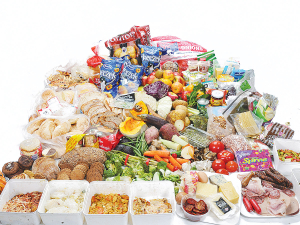NZ household food waste falls again
Kiwis are wasting less of their food than they were two years ago, and this has been enough to push New Zealand’s total household food waste bill lower, the 2025 Rabobank KiwiHarvest Food Waste survey has found.
 Forty nine per cent of all New Zealand households have taken action to reduce their food waste over the past 12 months.
Forty nine per cent of all New Zealand households have taken action to reduce their food waste over the past 12 months.
New research reveals that New Zealand households have made progress in reducing food waste over the past year, cutting the annual amount wasted by an estimated $300 million in the past year alone.
Forty nine per cent of all New Zealand households have taken action to reduce their food waste over the past 12 months.
HelloFresh’s study of 1,500 New Zealanders was undertaken to gain an understanding of Kiwi food waste habits and how the results stack up year-on-year.
The findings come as rugby star Portia Woodman-Wickliffe teams up with HelloFresh and food rescue charity KiwiHarvest for a ‘team talk’ on Kiwis food waste habits.
Since partnering with HelloFresh in 2023, Woodman-Wickliffe has been actively championing the reduction of household and food waste and says she applauds the efforts of Kiwi households.
“It’s encouraging to see so many Kiwis doing the mahi at home to reduce food waste,” she says. “By taking simple steps like meal planning, cooking the right portions and storing food properly we can make a huge difference.”
Of the 1,500 Kiwis surveyed, 60% said they spend between $200 - $499 per week on food, up from 45% in 2023.
Those who spend less tend to be more mindful about waste, with 24% of households spending under $100 per week, reporting a significant reduction in the past 12 months.
On average, an estimated 9% of a household’s weekly food shop goes to waste, equating to $1,326 worth of food waste per household per year.
New Zealanders aged 18-29 have the highest rate of food waste, with 12.3% of their weekly food shop going to waste, compared to the national average of 9%.
Angela Calver, chief executive of KiwiHarvest, says food waste is an “undeniable” environmental issue.
“We’re proud to have just reached the milestone of celebrating 13 million kilograms of food rescued and redistributed to vulnerable communities since we started up in 2012 – but there is so much more work to be done,” Calver says.
She says that KiwiHarvest, alongside other food rescue organisations, is experiencing significant funding cuts and growing demand, “so it’s equally as important for Kiwis to help relieve the pressure on the environment by doing their bit at home”.
Claudia Baptista-Fernandes, managing director of HelloFresh New Zealand, commends the collective effort of both Kiwis and organisations like KiwiHarvest, highlighting how meal kits can play a role in reducing food waste.
“At HelloFresh, we are committed to reducing food waste globally by focusing our efforts on everything from the supply chain right to the home kitchen,” she says.
Federated Farmers is celebrating following the Government's announcement that young farmers will be able to use their KiwiSaver funds to buy their first home or farm.
The Meat Industry Association of New Zealand (MIA) today announced that Chief Executive Officer Sirma Karapeeva has resigned from the role.
The winners of the 2026 Hawke’s Bay/Wairarapa Dairy Industry Awards were announced at the annual awards dinner held at Copthorne Solway Park in Masterton on Thursday evening.
Environment Southland is welcoming this week’s decision by the Environmental Protection Authority (EPA) to approve the release of Blaptea elguetai, a leaf‑feeding beetle that will help control the highly invasive Chilean flame creeper.
This March, the potato industry is proudly celebrating International Women’s Day on 8 March alongside the International Year of the Woman Farmer, recognising the vital role women play across every part of the sector — from paddocks and packhouses to research, leadership, and innovation.
Fruit trader Seeka posted a record profit and returns to shareholders in 2025.

OPINION: A mate of yours truly reckons rural Manawatu families are the latest to suffer under what he calls the…
OPINION: If old Winston Peters thinks building trade relations with new nations, such as India, isn't a necessary investment in…